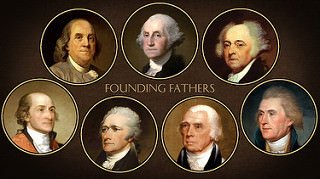
Hundreds of years before the Declaration of Independence was signed, the Magna Carta led the way for peoples rights in England. The Founding Fathers knew of the importance the Magna Carta, and desired for the United States of America to have rights for the people. The men who signed the Declaration of Independence, knew they would be killed if the fight for freedom didn't succeed. These men put their lives on the line to try this Great American Experiment, not knowing how it would succeed. The Magna Carta influenced the Founding Fathers to fight for the peoples rights,
During the American Revolution, the Magna Carta was referenced as justification actions in the defense of liberty. The colonists had a list of problems for the King of England. The Colonist knew they were entitled to the same rights as the Englishmen, one was the right of representation, and this was worthy of rebellion. The rebels in the United States knew they were not being treated fairly by the King, and rose up to defend themselves and their liberties. The Magna Carta was the official document referred to when the people of the United States showed their rights were being overlooked.
Here are some quotes connecting the ancient document, the Magna Carta to the liberties we have today.
Loyd Wright:
"I fear that we Americans too frequently take for granted out guaranteed rights of life, liberty and the pursuit of happiness. We often forget that the ceremonies in the meadow at Runnymede on the little island in the River Thames, where King John of England was forced to sign the Great Charter, as it were at the point of a sword, as but and outcropping of centuries of men's struggle to escape serfdom." -Loyd Wright (BYU Speeches of the year 1961, p 2)
Loyd Write:
The Magna Carta established for the first time four fundamental principles. First, the king must rule in accordance with the desires of the people. Second, government is a contract between the king and the people that neither one can break without being called to account. Third, the arbitrary power of the king is restricted in many things which the charter declares he may not do. Fourth, the rights of Englishmen are stated definitely and exactly.
While not really finally implemented for four centuries there was a continuous evolutionary process establishing the law of the land." (BYU Speeches of the Year 1961, p. 3)
David O. McKay:
"Throughout the ages advanced souls have yearned for a society in which liberty and justice prevail. Men have sought for it, fought for it, have died for it. Ancient freemen prized it; slaves longed for it; the Magna Carta demanded it; the Constitution of the United States declared it." (The Church and the Present War, p 341)
Ezra Taft Benson:
"Religious freedom cannot prosper where political freedom does not exist. Again, history records that the spark which kindled the flame of political liberty among men commenced in Great Britain. Somewhat over a century before Wycliffe's birth, an event took place in England that opened the door to a recognition of man's rights by abridging the power of the king. Until then, human rights were looked upon as something a monarch might grant to his subjects. On the soil of Runnymede in the year 1215, the English monarch, King John, formally recognized in writing that he had encroached on mans sacred rights, and thus one of history's most influential documents was born, the Great Charter. Since that time this document, also known at the Magna Carta, has become a symbol of man's freedom.
For man to exercise fully the agency of God has grated to him, his God-given natural rights must be recognized and protected. It has only been recognized within the past four hundred years that these rights inherently belong to man. It was historical documents such as the English Petition of Rights and the English Bill of Rights that first recognized the 'immemorial rights of Englishmen.' I believe these movements were inspired of the Lord. Later these God-given rights were to become guaranteed by New World documents, such as the Declaration of Independence and the American Bill of Rights." (This Nation Shall Endure, p 3)
References:
"The Good and the Beautiful" Year 1 Course Work p 86
